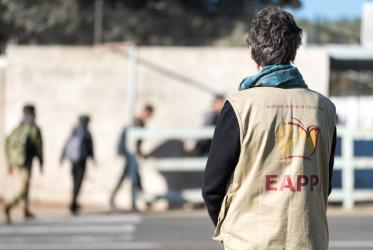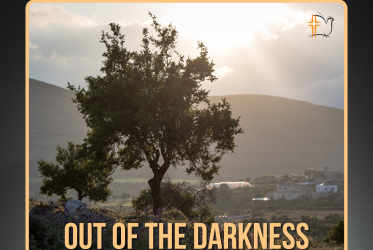As an “ecumenical accompanier,” Prokop’s role description might include: “walks children to school,” and “shares what he sees.”
In many communities, these tasks are daily - even mundane - parts of life. But for Prokop, who has served with the World Council of Churches Ecumenical Accompaniment Programme in Palestine and Israel (WCC-EAPPI), walking children to school was anything but humdrum.
In fact, Prokop came to think of the walk to school as “a repetitive roulette.” Serving in Hebron and Bethlehem, he walked children of all ages to school. “One day everything went fine, another day they were searched by soldiers, their teachers were stopped, settlers harassed them or school was simply closed by the military,” Prokop said. “I saw children frightened to go to school and afraid of what would happen that day while they were in school.”
Violence, tear gas and riots near the schools are an everyday occurrence, he said. “Not one of us would sympathize with the policy of occupation if this were our children going to these schools,” he said.
Prokop and other ecumenical accompaniers - or EAs - shared their first-hand observations with representatives in the European Union during an advocacy week in Brussels held 22-25 January. Nine EAs from Austria, Denmark, Finland, Germany, Ireland, Netherlands, Poland, Sweden and the UK met with members of the European Parliament and other government officials to report what they have seen “on the ground” and present recommendations.
The EAs relayed how the lack of peace in Palestine and Israel reduced children’s access to education.
One EA, Lottie, said she saw children from the settlements being escorted in and out of their homes by security guards. “It broke my heart to see these two communities living side by side, but with a total lack of harmony,” she said.
One of the goals of WCC-EAPPI is to ensure safe access to schools under occupation, explained Rev. Dr Owe Boersma, WCC-EAPPI international program coordinator. “In occupied Palestine, the obstacles to receiving an education are numerous. Large numbers of Palestinian children living in the West Bank and East Jerusalem experience serious harassment and hurdles on their way to and from school, as well as in school yards and classrooms.”
Since April 2012, EAPPI – in cooperation with UNICEF – has monitored access to education for children in the West Bank and East Jerusalem, said Boersma. “In 2018, Ecumenical Accompaniers are providing a protective presence to some 4,400 students and 300 teachers by monitoring nine schools, as well as six checkpoints that children pass through on a daily basis,” he said. “The presence of EAs deters soldiers and settlers from harassing children on their way to and from school.”
Children walking to school have reported they feel afraid of settlers and scared of soldiers who are pointing guns at them, stamping their feet, or driving very fast.
The EAs spoke to EU officials about how they worked to create conditions for a just peace.
“As I spoke of the experience in Brussels I felt grateful and humbled to be able to share the stories and to play my part in ensuring that this conflict will not be ignored or forgotten while EAPPI stands as a protective presence for those who continue to ask for it,” said EA Lesley, who added that the EAs support the work of both Palestinian and Israeli peacemakers.
Another EA, Lise, said she hopes that EU leaders understand that they should play a bigger role in the peace process.
“At least, I hope that more people understood the degree of suffering and in general how bad the situation actually is in Israel and Palestine,” she said.








